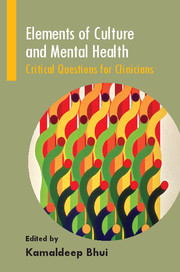Book contents
- Frontmatter
- Contents
- List of contributors
- Foreword: Desire and commitment: essential ingredients in learning about culture and mental illness
- 1 Is trauma-focused therapy helpful for survivors of war and conflict?
- 2 Will ethnopsychopharmacology lead to changes in clinical practice?
- 3 Does cognitive–behavioural therapy work for people with very different cultural orientations and backgrounds?
- 4 Can you do meaningful cognitive–behavioural therapy through an interpreter?
- 5 Are particular psychotherapeutic orientations indicated with specific ethnic minority groups?
- 6 Can psychotherapeutic interventions overcome epistemic difference?
- 7 On the role of culture and difference in evaluation, assessment and diagnosis
- 8 Necessary and sufficient competencies for intercultural work
- 9 On the validity and usefulness of existing Eurocentric diagnostic categories
- 10 Benefits and limitations of the cultural formulation in intercultural work
- 11 Barriers to the intercultural therapeutic relationship and how to overcome them
- 12 How does intercultural interpretation work in the mental health setting?
- 13 Do the power relations inherent in medical systems help or hinder in cross-cultural psychiatry?
- 14 Recovery and well-being: a paradigm for care
- 15 Social perspectives on diagnosis
- 16 Public mental health and inequalities
- 17 Can you do psychotherapy through an interpreter?
- 18 Can race and racism be acknowledged in the transference without it becoming a source of therapeutic impasse?
- 19 Cultural competence: models, measures and movements
- 20 Religion, spirituality and mental health
- Index
6 - Can psychotherapeutic interventions overcome epistemic difference?
Published online by Cambridge University Press: 01 January 2018
- Frontmatter
- Contents
- List of contributors
- Foreword: Desire and commitment: essential ingredients in learning about culture and mental illness
- 1 Is trauma-focused therapy helpful for survivors of war and conflict?
- 2 Will ethnopsychopharmacology lead to changes in clinical practice?
- 3 Does cognitive–behavioural therapy work for people with very different cultural orientations and backgrounds?
- 4 Can you do meaningful cognitive–behavioural therapy through an interpreter?
- 5 Are particular psychotherapeutic orientations indicated with specific ethnic minority groups?
- 6 Can psychotherapeutic interventions overcome epistemic difference?
- 7 On the role of culture and difference in evaluation, assessment and diagnosis
- 8 Necessary and sufficient competencies for intercultural work
- 9 On the validity and usefulness of existing Eurocentric diagnostic categories
- 10 Benefits and limitations of the cultural formulation in intercultural work
- 11 Barriers to the intercultural therapeutic relationship and how to overcome them
- 12 How does intercultural interpretation work in the mental health setting?
- 13 Do the power relations inherent in medical systems help or hinder in cross-cultural psychiatry?
- 14 Recovery and well-being: a paradigm for care
- 15 Social perspectives on diagnosis
- 16 Public mental health and inequalities
- 17 Can you do psychotherapy through an interpreter?
- 18 Can race and racism be acknowledged in the transference without it becoming a source of therapeutic impasse?
- 19 Cultural competence: models, measures and movements
- 20 Religion, spirituality and mental health
- Index
Summary
Psychotherapy, indeed the very notion of mental illness and its treatment, are predicated on a modernist epistemic paradigm (Kvale, 1992; Doucet et al, 2010). Modernism became the dominant epistemic paradigm in the Western world in the 17th century, when empiricism and reason replaced the idea of direct revelation from God as a way to approach the truth. Modernism in psychotherapy implies a vision of a practitioner who is value-free, objective and unbiased. Postmodernism appeared in the 20th century and questions the very notion of objective truth. Its influence in psychotherapy involves the therapist's awareness of operating from within specific language and sociohistorical frameworks (Lyddon & Weill, 1997).
Kelly (1955) noted that patients try to understand what is going on in their lives in much the same way as scientists try to develop hypotheses about the world; patients have constructions of their reality as scientists have theories. If we understand the psychotherapeutic process as one of scientific interchange and as a form of knowledge generation, we may understand that therapists and patients adopt different roles with differing expectations, depending on the epistemic paradigm they embrace (independently of the awareness they have of it).
The German word Weltanschauung(world view) has been extensively used in psychology to refer to sets of assumptions that people use to understand and describe their lived experience of reality. Koltko-Rivera (2004) defines world view as ‘a set of beliefs that includes limiting statements and assumptions regarding what exists and what does not (either in actuality, or in principle), what objects or experiences are good or bad, and what objectives, behaviors, and relationships are desirable or undesirable’.
We define epistemic mismatch in psychotherapy or counselling as a phenomenon that would occur when the epistemic vision of therapist and patient belong to different paradigms. This phenomenon may happen in the meeting between people of different cultures whose epistemic views are incompatible (Owusu-Bempah, 2004). A common scenario would be an encounter between a modernist therapist and a patient whose world views collide with rationalism, who relies on mysticism to explain the world.
- Type
- Chapter
- Information
- Elements of Culture and Mental HealthCritical Questions for Clinicians, pp. 27 - 30Publisher: Royal College of PsychiatristsPrint publication year: 2013



